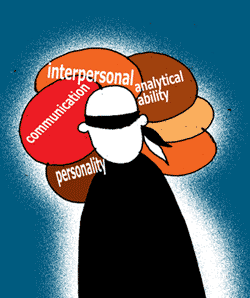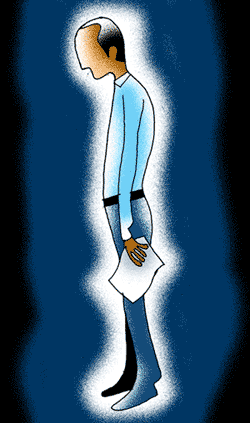Almost every job interview that a candidate attends comes to a point where he has to answer these two questions:
1 .What are your strengths?
2. What are your weaknesses?
Mentioning strengths for which you don't have examples will be useless. Similarly, saying that you don't have any weakness is also not acceptable.
Go through these tips to ensure that you answer strengths and weaknesses questions appropriately and have examples ready to support your answer.
Kshipra Singh is a contributor to CareerRide.com, a website that provides answers to technical and personal questions asked during an IT interview.
Illustrations: Dominic Xavier
Analysing your strenghts
Image: List down your five major achievementsThe idea here is to show how well you match the job.
1. List down your five major achievements.
Make a list of your achievements that you are proud of. It will be good to list down some achievements from the recent past. However, listing down some things from the long past won't hurt either.
2. List down the personal qualities, skills, knowledge and attitude that were required to achieve it. Do it for each achievement.
3. Make a list of qualities appearing again and again in the list.
4. Select the top qualities. These are your strengths.
5. Match them vis a vis the qualities required for the role under discussion and put the relevant ones across.
6. Have examples ready for each strength.
Let us try to understand this with the help of an example.
| Five major achievements | Requirements to achieve this |
| Chosen 'Employee of the month' for Nov-10 | Result oriented, communication skills, confidence, team player, subject knowledge, hard working, intelligent |
| Promoted to Team Leader role in one year. | Managerial skills, knowledge, communication, result oriented, approachable, team player, hard working, intelligent |
| Won the intra-house presentation competition | Communication, presentation skills, confidence, subject knowledge |
| Got the new team members working in one month. | Training skills, communication skills, subject knowledge, patience. |
| University topper during BE and MBA | Subject knowledge, hard working, intelligent, confident, written communication |
So, the strengths that emerge out of this table are:
1. Result Oriented
2. Good communication skills
3. Subject Knowledge
4. Confidence
5. Team player
6. Hard working
7. Intelligent
Now, match these strengths with the job role you are being interviewed for and put the relevant ones across. Do not forget to back them up with an example.
Analysing your weakness
The key to answering the weakness question is to offer an unrelated weakness that will not have an impact on the role you have applied for. Here's how to go about it:
1. List two things un-related to your profession that you cannot do. For example:
a. I cannot tailor my own clothes although my mother is a good tailor.
b. I cannot cook a variety of dishes although I have been cooking for years now.
2. List two things related to your profession that you do very accurately.
a. I have a keen eye for detail.
b. I don't like to take short cuts.
3. List two things un-related to your profession that charge you up and you like them.
a. Ice creams
b. Playing with my son
Now you have three types of weaknesses that you can offer to the interviewer depending on the environment in which the interview is moving.
The first set of weaknesses are those not related to your work and they won't matter to the employer.
The second set of weaknesses are actually your strengths but you can say that others accuse you of doing them 'too much' but you think that they are important.
The third set is a set of weaknesses that you can offer if the interview is moving on in a light environment.
Remember, all these have to be accompanied with the right body language!



Comment
article